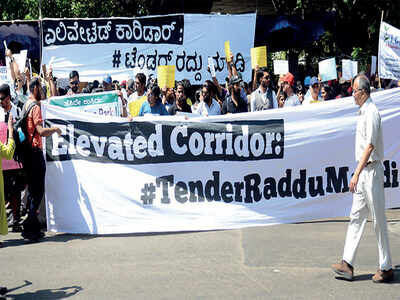
With just a day left to submit suggestions for the Comprehensive Mobility Plan (CMP), citizen groups are questioning the legality of the vision document given that it is prepared by Bangalore Metro Rail Corporation Limited (BMRCL), which is the implementing agency as well. One grouse of the groups is that the CMP has brought back the elevated corridor projects that had been shelved in the past.
“The BMRCL has no business in preparing a CMP for Bengaluru. It’s not a planning agency. This is like asking the contractor to plan for the city. I have suggested to the groups not to submit inputs as the CMP is unconstitutional,” said Leo Saldanaha, coordinator at Environment Support Group. He plans to write to Chief Secretary TM Vijay Bhaskar against the CMP.
The primary reason for citizens objecting to the CMP appears to be the proposed elevated corridors. The draft CMP has proposed around 90-km of elevated corridor, costing a total of about Rs 18,000 crore, in the next 10 years.
“We plan to send at least 5,000 emails, asking the BMRCL to remove elevated corridors from the CMP. The project was cancelled due to massive public opposition last year. Our city needs to stay focused on public transport for the next 15 years since we missed the boat for the last 30 years. Also, focus should be also on building good footpaths,” Srinivas Alavilli, co-founder of Citizens for Bengaluru, said.
The last date to share suggestions and inputs to the CMP is January 20.
The BMRCL, with the help of Directorate of Urban Land Transport (DULT), took the onus to prepare the CMP as it was mandatory for the Namma Metro officials to submit the report to claim funds for the future Metro projects. The two Metro projects — the 18-km Outer Ring Road and 35-km airport line — were pending for approval at the Central Government level as the city did not have a CMP.
Once the CMP is final, the government is likely to use it as a basis for future funding of any projects. The 226-page report has listed out projects worth Rs 2.30 lakh crore, to be implemented in different phases between 2020 and 2022, 2023-27 and 2028-2031. There are altogether 80 projects including elevated corridor, MetroLite, Peripheral Ring Road, elevated walkways and suburban rail project.
Prof Ashish Verma of Indian Institute of Science (IISc), Bengaluru, said the CMP has both s positives and negatives. He appreciated the plan of focusing on transit oriented development (TOD) that sets to bring at least 25% area of Bengaluru Metropolitan Area under TOD. The emphasis on public transit modes such as suburban rail, BRTS has also received a thumbs up including the proposal of an underground inner ring Metro line.
The professor, however, said the plan to augment the capacity of road infrastructure will only offset any efforts to achieve the target mode shares of public transport, walking, and cycling. He also felt short-term measures like junction improvement plans etc. need not be part of a CMP document the focus of which is generally medium and long term.



